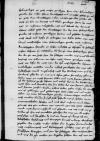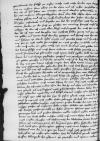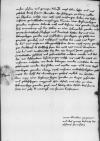Letter #2514
Anna DUNCKEN & Cistercian convent in Żarnowiec to Ioannes DANTISCUSŻarnowiec, 1546-11-22
English register:
Abbess Anna Duncken and the Cistercian convent in Żarnowiec ask Ioannes Dantiscus for advice and support in connection with the actions of the Bishop [of Kujawy-Pomerania, Andrzej Zebrzydowski] that are ruining their convent.
She complains that she was forced to put up the Bishop with a 300-strong mounted retinue at the convent for three days. While there, the Bishop demanded to be handed all of the convent’s privileges and documents. The Abbess refused, citing existing privileges, the Abbot in Oliwa [Adrianus], Johann von Werden and the administrators appointed by the King to oversee the convents in Żarnowiec and Oliwa — Johan Brandes and Jurghen Roßenbark. She also stated that the privileges were kept in the city [Gdańsk]. The Bishop destroyed all the documents he obtained, invoking the King’s alleged orders, in which the abbess does not believe because the King has always regarded the religious very favourably, while the running of the convent has been exemplary.
The Bishop then ordered an inventory of the convent’s assets to be drawn up. He fired all the convent clerks, and to the posts of starost, scribe and servant he appointed Polish men with whom the Abbess is unable to communicate and who only eat, drink and feed their horses pure oats while the convent horses eat chaff and bran. He also took the convent’s best horses. He sent a Polish chaplain with a servant, and the convent has to feed them against its will and beyond its means. These are the reasons why the convent is unable to support itself, as previously, from alms and the bequests of Gdańsk burghers.
The Bishop also appointed an administrator of the convent estate, Kaspar Munkenbeg, who is completely unfit for the job. He also took away letters concerning the church in Puck and the abbey boundaries, promising to return them through his scribe, but he still has not sent them back.
The Abbess asks Dantiscus to write a letter to the King asking him to protect and liberate them from this harassment.
| received Heilsberg (Lidzbark), 1546-12-21 Manuscript sources:
| ||||
Text & apparatus & commentary Plain text Text & commentary Text & apparatus
Dem hockwyrdygen yn Goth vather und herenn, herenn
Hockwyrdyger yn Goth vather, genedyger herre. Euer hockwyrdygen genoden / ßey unßer ghancz demutthyghes und ynnyghes ghebeth czu voran czu Gothe deme almechthygen neben wunschunghe alles gutthen alle czeyth czu fur an bereyth und bofeln. Genedyger herre.
Dye weyl wyr yn unßerenn anlyghenden noth und bedrock bey neymants antthers nehest Gothe dem almechthygen, dan bey Euer hockwyrdygen genoden als unßerem genedygem herenn und gelybthen lantheßman rath, throst und hylffe czu yrlanghen vor hoffen, haben wyr nyth kunnen untherlosßen, Euer hockwyrdygen genoden myth unßerenn demutthyghem schreyben yn hocher andechthe czu beßuchen, / und / dy ßylfthygen unßere boeßwer czu enththecken, als dye czu Euer hockwyrdygen ghenoden der czu vor ßycht ßeyn, / dye ßelthygen warden uns armen bdrockten, itczunth von eyderman vor losßen, myth Euerm genedygen rathe nyth vor losßen, dae myth wyr / dye hye noch folghenden boßwere enthleddyghet moechthen warden.
Erstlych genedygher her, wye nhu
Czum anderen, / wye / wyernhu ghemelthe czeyth / byschoflyche wyrde myth ßeynem geßynde und pfherden noch noth trofft aus gehalden, / yst her uns annredthen gheweßen, das wyr ym alle unßer pryfyleya und schryfthen, dy uns von konye ctzu konye, och von bobestlycher heylykeyth und harczogen ßampth anderer oberykeyt gegeben, / dae mytthe unßer closther ffor langhen jaren fundye reth confurmyrth und bestethygyth, / ßulthen wyr ym czu furscheyn brenghen und ym dye ßelthygen ober anthworthen, und uns doe czu unther ym begeben ßolthen. Dar uff wyr ym geanthworth, das ßulchs yn unßer macht nyth wehr, ßunder wyr beryffen uns an unßern hern
Dor nach hoth ßeyne genode alles fye und als was uff unßerem hoefe geweßenn, das czum closter gehuerth, durch den geßatczthen schreyber, ab es propperlyckg ßeyn wer, beschreybe losßen.
Czum fyrden hoth er uns all ampth leuthe abe geßatcz und ßeynes gefaller myth eynem polenschen starasten und eynem polnschen schreyber ßampth dryn palnschen knechten unße ampth beßatcz, doe wyr doch nyth mytthe reden kunnen, dye och nyth anders thun, dan das ßy wol esßen und thrynken und yre pferde wol aus futtheren myth gelautherthem clarem haber, dar wyr unßer pfherden myth kley und hakßel futteren musßen.
Czum ßepthe ßeyn genod wegk czyn wolth, lyß her fyr dy pesten pferde wegk nemen, dy ym weren, dy wyrnoch nyth wydder haben gekryget. Och hoth her uns eynen ungeschyckten polschen capflan myth eynem großen knechte, das wyr ytcz ßyben mußger perßon uff unßerem habe musßen halthen czu czeythen czum tysch ylff dreczen perßon czu tysch yn dysßer ßweren theuren czeyt nyth myth gerynger kost und großem schathen wydder unßeren wyllen, entlych czu unßerem vor darbe halden musßen, welch unße arme closter doch alle czeyt myth mylden almysßen und thestamenth der lobelychen staeth Dantczke enthalten yst, mus ytcz gancz czu drommeren geen.
Czum ßybenden hoth her uns eynen czum habemester geßatcz myth nome
Czum achthen hoth des bysscoffes genode ethczlyche bryffen belangende dye pfharre czu
Aus dysßen unßeren grunthlychen anczeungen kunnen Euer hogkwyrdygen genoden unßeren bedrock, noth und beßwer aus genoden leychtlych ermarkent. Yst der halben an Euer hokwyrdyk genoden unser gantcz frunthlych fleyßyge und demuttyk bytthen, das uns Euer hokwyrdygen genoden aus crystlychem genedygen czu gethonem gemuthe genedyk und erscheynen wylleth, dae myth uns kegen dy konigliche maiestet unßerem aldergenedykgesten heren myth eyner genedygen forschryft be hulflyckg ßeyn, dae myth wyr armen juncferen aus konigliche maiestet aucthorythet bey den vor langnen joren gegeben freyheythen geschüth und gehanthabeth moechten warden, und das dye vor beschrybene boßweryngen, welche uns myth der czeyth czu unßerem entlychen vor darbe belangen warden, moechthen doe van ghefreyeth warden. Das ßullen und wyllen wyr ummb Euer hogk wyrdygen genoden alweg myth unßrem andechthychghem gebet myth der hylff des almechtygen Gothys wyllyk vor schulden, dem wyr Euer hogkwyrdygen genoden yn langer geßunthet und gelokßelygem regyment thun befeln, uns aber yn Euer hokwyrdyge genoden gonst und schutcz thun befeln.
Datum



